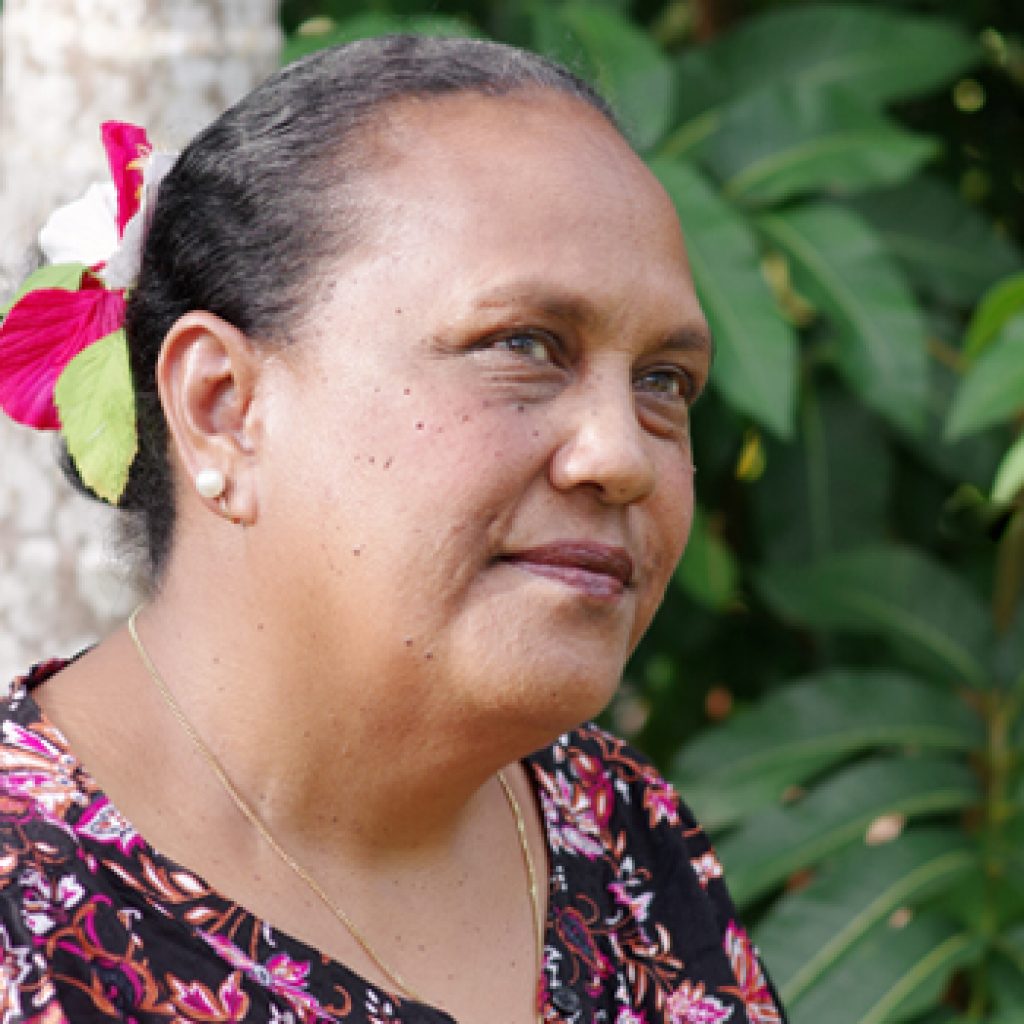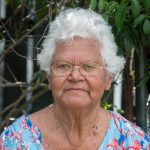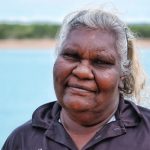
Remember that you don’t get respect by telling people the things that you’ve done; you get respect from people by doing the things that count and doing them without complaint.
Patricia is a founding member and Treasurer of NPA Family and Community Services ATSI Corporation. She has been integral to advocate for the needs of the NPA to strengthen the services at the Women’s Shelter.
I’m actually from Torres Strait and come from a very large family.
My Mum and Dad had 14 biological children and 10 adopted children. All the 14 biological children were given to families who didn’t have any children and I’m one of them, a person who was given out as well.
My adopted parents passed away when I was very young but it’s the Island culture that we don’t go back to our biological families, we go to the traditional adoption family and we stay with the traditional adoption family.
So, I suppose that one of the things that I inherited at a very young age is learning to provide and to take responsibilities and to make things work as they go along.
Living in the Torres Strait Islands, I spoke fluent Torres Strait language but a very small amount of English. After Grade 7, however, we were sent to a boarding school in Warwick, which was very foreign.
When we arrived this seemed a very sophisticated boarding school, which was very scary. But gradually you get used to the cold, you learn new things, and we would fly back home every school holidays.
I think one of the things that actually made me look at things differently was actually the good education I got from attending this boarding school.
Later in my youth, I went back to my biological parents and took the principles and values of contribution and survival. I learned that everyone has their role and responsibility in the community.
I suppose the thing is that my parents are very cultural people too and we had to follow cultural protocols. In certain things we let the men eat first, the woman eat after but everybody actually shared responsibility of all duties; looking for food, bringing water from the brick wells. It was hard work.
I only moved to Bamaga when I was 17 years old and saw very quickly that there was a lot of work needed to be done in the Northern Peninsula Area. Coming from a large family, I didn’t experience violence growing up but I saw the violence in this community and saw a lot of things needed to be done to solve this.
So, I we went around to the houses in the community to survey the the women and families to see what we could do to help. This led to me joining a group of ladies to start an organisation called NPA Family and Community Services. I think what really motivated us was the child safety issues, the domestic violence issues, and that we could see that we needed to make a lot of difference in the community. I guess this was just my passion from Day One.
I think I was influenced by my biological Mother, who actually took children who couldn’t survive for themselves. It was the love that I saw the children grow up with that inspired me.
When I started NPA I thought:
Oh my God, what is happening? This community needs a lot of support! And I can’t do it alone, I’m going to need a group of ladies to take on the initiatives and I know that the man won’t like it but I’m just going to have to work with one or two.
I always remind our people that nobody is going to do it for us because we’re such a small population. We’ve got to do it ourselves, we’ve got to put forward the issues to the government for anyone else who wants to work with us. And it’s important, my role in the organisation, that I’m there to support and work with the ladies. They can speak for themselves, it’s not one person speaking.
I think it was hard for me as the Cape communities had a culture of women doing exactly what the men said. My biological Mother though, was a very different person. Even though we practiced our cultural protocols where the men eat first, in the eyes of our families we were equal. Also my time at the boarding school showed me that men and women were equal. So coming to this community where the men were the bosses in the family presented some challenges.

What does NAIDOC Week mean to you?
I think it’s a good thing that we have a National Aboriginal and Torres Strait Islander Day for celebration – it’s actually very important.
Every NAIDOC Week, our community has always made efforts to celebrate it. I think one day a year we need to celebrate this National Day.
It’s important because for a long time, Torres Strait Islanders couldn’t vote. When the Referendum came through and the opportunity to vote, that gave a different life to our people.
Personally I mark this week by celebrating the success of our community.
For example, when I moved to Bamaga, not many people were working. We told the Queensland Government that if they put childcare centres in the community, then two parents can work and we can reduce the financial strain on households and reduce instances of Domestic and Family Violence.
The State Government told us that with such a small population, we couldn’t have funded childcare services, but they might be able to provide limited hours of support. We accepted this offer and developed a smart thinking strategy around childcare for our people. Since this time, we’ve now got eight licenced centres – four long day care and four after school care. I can tell you that once these services were available, Domestic and Family Violence rates decreased big time. The more income that came into the houses, the more people were working and less prone to fighting.
It’s also empowered women as the men now know that they’ll press charges and have the capacity to work. Also men are going to work and have pride in themselves. I believe that the freedom to work and create and earn a bit more money means that people make better choices.
I have four children, my two girls went to boarding school and my two boys are still in Bamaga. They speak the same language and we’re very cultural people. My eldest daughter has her Masters and a Double Degree, my other daughter’s got a Diploma and my two sons got their qualifications and are in Trades.
My family would also help the community as well. They are very proactive in the community. They know the value for us to work with our community and appreciate our culture and appreciate being Aboriginal and Torres Strait Islander people. It’s really important that we know where our identity is.
We embrace our culture including our support for the community for initiation ceremonies when boys and girls reach puberty. Some families can’t do it themselves so we help them. There is a group of us and we help them out and we make it very successful, meaning we do the initiation, we do the dancing, and then we’ll do the cooking as well. Also, these ceremonies are where we cultural knowledge passed down to them. We teach them to read climate through the direction of the stars and the position of moon, we show them how to look at the waves – we pass on our cultural knowledge in these ways.
What is your professional role in the community?
I am a Director of the Women’s Shelter, but more of a strategic person. As the Treasurer, I make sure the money is being used for the right purpose. We actually employ over 100 people and one of our focuses is on the need for economic employment for our people. If we don’t help out with employment, then we have no hope for our population.
I have also run a Health Service as Executive Director for Queensland Health. The majority of the women who worked with me came with no skills, but I’m proud to say that five or six years later, they would have Diplomas and be standing strong. While I was in this position, I pushed government hard for a new hospital. I was told “Patty, your population is so small, you’re not even in the 10-year hospital plan for Queensland.” I thought to myself, “Well I’m not stopping there, I’m going political.”
Sure enough I went political and we got our hospital in 1999. So, we never give up. They told me that the population was too small so we went out, really out, and all the community ladies got together and said, “we won’t settle for this”. So, we got a new hospital in Bamaga and on top of that got new health centres in all the communities around us.
I think I’d like to thanks Queensland Health too, for giving me that opportunity to do that as a community development.
I was also a founding member for an organisation call Remote Area Childcare Services which is still running today. We founded this in NPA and then I took it to Cairns and once it got established, I was the first President there and remained for 15 years. They still look after all the children services in Cape York community. I think that has contributed to the wellbeing of our children and giving them a better future in life. I make it my business to participate in national community so that I get professionally develop and so that I can contribute nationally and contribute back to the communities as well.
If you could give a message to Aboriginal and Torres Strait Islander Women (or the wider community) this year, what would it be?
Don’t forget who you are and where you’re from. It’s important to strengthen our culture, especially on NAIDOC day.
It’s also important to treat people the way you want to be treated and to support people, because one day, you’re going to need that support yourself.
Remember that you don’t get respect by telling people the things that you’ve done; you get respect from people by doing the things that count and doing them without complaint.


